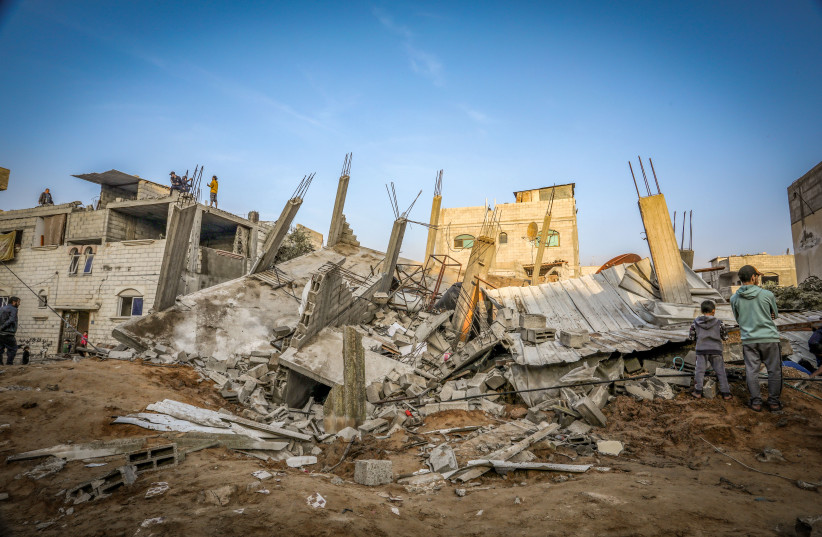The Gaza war is a “carnage” and an arms embargo should be applied against Israel and others involved in the fighting, United Nations High Commissioner for Human Rights Volker Turk said on Thursday.
“Thousands of tons of munitions have been dropped by Israel on Gaza, including repeated use of explosive weapons with wide-area effects,” Turk told the UN Human Rights Council in Geneva, whose 55th session opened this week.
He described the impact of the IDF bombings on Gaza, which at the start of the war was home to 2.3 million people.
“These weapons send out a massive blast wave of high pressure that may rupture internal organs, as well as fragmentation projectiles, and heat so intense that it causes deep burns – and they have been used in densely populated residential neighborhoods,” he described.
Calling an end to the Gaza war
“The war in Gaza must end. Clear violations of international human rights and humanitarian laws, including war crimes and possibly other crimes under international law, have been committed by all parties. It is time – well past time – for peace, investigation, and accountability,” he said.

International humanitarian law, he warned, is incumbent on all parties, not just those directly involved in the conflict, but also their allies who were sending arms.
“This responsibility comes alive when there is a real risk that arms transferred to a party to a conflict may be used in violation of this law.
“Any such enabling of violations of international humanitarian law must cease at once. This is the core of due diligence,” he said.
The number of fatalities in Gaza has exceeded 30,000, with dozens missing, of whom many are presumed to be buried under the rubble.
Israel has said that over 11,000 of those killed are combatants and has stressed that it has sought at all moments to minimize civilian casualties as it conducts a military operation to destroy Hamas in the aftermath of the October 7 invasions of its country led by that terror group.
Over 1,200 people were killed in that attack, and another 253 were seized as hostages.
Turk acknowledged that “the attacks on Israeli civilians on 7 and 8 October were shocking. Profoundly traumatizing. And totally unjustifiable.
“The killing of civilians, reports of torture and sexual violence inflicted by Hamas and other Palestinian armed groups, and the holding of hostages since that time are appalling and entirely wrong,” Turk said.
But he cautioned, “So is the brutality of the Israeli response; the unprecedented level of killing and maiming of civilians in Gaza, including UN staff and journalists.”
This has been accompanied by a “catastrophic humanitarian crisis” caused by the destruction of the enclave infrastructure and service systems, including hospitals, health services, and aid distribution.
His office, he said, has documented many incidents that “may amount to war crimes by Israeli forces, as well as indications that Israeli forces have engaged in indiscriminate or disproportionate targeting that violates international humanitarian law.”
Warning against an IDF operation in Rafah
He warned against an IDF military operation in Gaza’s Rafah, which he warned would lead to a “massive loss of life” and “new displacements.”
He said he failed to see how such an operation could be in keeping with the provisional measures issued by the International Court of Justice, which is adjudicating a claim by South Africa that Israel’s actions in Gaza are tantamount to genocide.
There must be an “immediate ceasefire,” an “end to this war,” and a release of hostages, Turk said. He also called on Israel to release the thousands of Palestinians it has “arbitrarily” detained.
He spoke as part of a debate on accountability in the Israeli-Palestinian conflict. The Palestinian envoy Ibrahim Khraishi accused Israel of “genocide,” “apartheid,” “occupation,” and “racism” in its treatment of the Palestinians.
He called on UN member states to “stop exporting weapons” and to “cut economic and diplomatic ties” with Israel, adding that “we really need accountability.”
Israel’s Ambassador Meirav Eilon Shahar described for the UNHRC the October 7 attack and the existential threat that Hamas posed to Israel.
“Israel has been told time and time again that the terrorists who have diverted aid, built terror tunnels, brutally murdered innocent civilians, raped, beheaded, burnt families alive – cannot be touched because they hide among the civilian population.
“Yet we have no choice. We must go after Hamas, or they will continue to come after us,” she said.
Opponents of the war are misguided, she said, if they believe that all that needs to happen for peace to occur is for Israel to lay down its arms.
The UNHRC, she said, has become a forum where the rights of Israelis and Jews “means nothing.”
Eilon Shahar said, “If Israel withdraws from Gaza tomorrow, do you think Hamas would lay down its arms?
“Do you think Hamas will commit to not rebuilding its tunnels and restoring its terrorist arsenal and instead commit to justice and peace?
“You think if Israel stops this war today, Hamas will return all our hostages tomorrow? Mr. High Commissioner, the answer is simply no,” she said.
She pointed to two women, Aviva Siegel and Raz Ben Ami, who had been kidnapped on October 7 and then released in November as part of an initial deal between Israel and Hamas.
Their husbands Keith and Ohad are still being held in Gaza, she said.
The UNHRC should have been a symbol of hope for these two women who for over 50 days “endured unspeakable horrors in Hamas captivity.”
Instead, she said, “they have become a mere footnote in the discourse of this council.”
